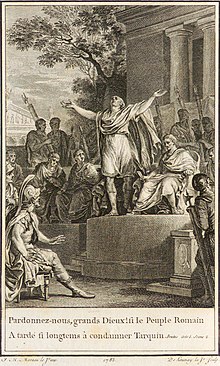Brutus (Voltaire)
| Data | |
|---|---|
| Title: | Brutus |
| Genus: | tragedy |
| Original language: | French |
| Author: | Voltaire |
| Premiere: | December 11, 1730 |
| Place of premiere: | Paris |
| people | |
|
|


Le Brutus is a tragedy in five acts by Voltaire . The piece was begun in England in 1727, completed in 1729, but only performed in Paris on December 11, 1730 .
action
Voltaire took the material about the first legendary consul of Rome, Lucius Junius Brutus (509 before the turn of the century), from Roman historiography. The son of the Republican Brutus, Titus loves Tullia, daughter of the last Etruscan king of Rome Lucius Tarquinius Superbus , and becomes a traitor because of the ensuing entanglement. The Senate hands Titus over to his father, who forgives him but causes his execution to consolidate the republic.
Additions
Voltaire added a Discours sur la Tragédie dedicated to Lord Bolingbroke to the first edition published in 1731 , in which he explained his intention.
Contemporary reception
The audience reaction was divided. The inconsistency of the place and time of the action was criticized. The father's tough demeanor was also displeasing. The actually well-attended piece was removed from the repertoire after a few performances. The openly displayed republican tendencies naturally displeased the authorities. Voltaire preferred to spend some time incognito in Rouen .
Performances
It premiered in the Comédie-Française on December 11, 1730. After a few performances, the republican tragedy was removed from the program. Significantly, the piece experienced a comeback at the time of the French Revolution . The National Convention ordered Brutus to be performed on August 2, 1793 with free admission.
Going to press
It was printed in 1731 by Jean-François Josse in Paris. Thirteen individual editions followed until Voltaire's death. Another twelve editions were added between 1790 and 1794.
First editions
- Brutus , Jean-François Josse, Paris, 1731, XXXII, 110, (3) p. [1]
- Brutus , Jean-François Josse, Paris, 1731, XX, (1), 80, (2) pp. [2]
- Brutus, Seconde Edition revue & corrigee par l'Auteur, EJ Ledet & Compagnie et Jaques Desbordes, Amsterdam, 124 (1) pp.
literature
- Theodore Besterman: England and the English Letters (1726–1728), in: Voltaire, Winkler, Munich, 1971, p. 96 ff.
- John Paul Renwick: Brutus, in: Dictionnaire Voltaire, Hachette Livre, 1994, p. 25.
- Siegfried Detemple: Voltaire: Die Werke, catalog for the 300th birthday, Berlin, 1994, p. 32 f.